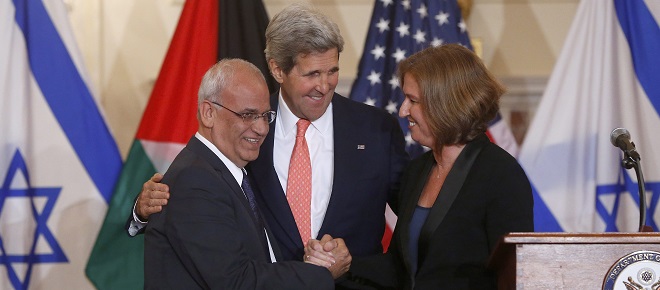A skeptical Middle East witnesses tenuous peace talks
Neither the Israelis nor the Palestinians are confident that peace is near
Secretary of State John Kerry stands between Israel’s Justice Minister and chief negotiator Tzipi Livni, right, and Palestinian chief negotiator Saeb Erekat, as they shake hands after the resumption of Israeli-Palestinian peace talks, Tuesday, July 30, 2013, at the State Department in Washington. (AP Photo/Charles Dharapak)
Share

Hope for peace in the Middle East was, as ever, fleeting. When Israeli and Palestinians sat down for a new round of surprise, U.S.-led negotiations, hope won the day exactly once. Now, as Maclean’s Michael Petrou explains, the same old skepticism that’s frustrated both sides for decades continues to do its thing. Neither side has much faith in peace, but they don’t turn down the Americans when they come calling.
In the days before these most recent negotiations, the National Post gave voice to outraged Israelis after their government sgreed to turn over 104 Palestinian prisoners—a precondition for negotiations. The next day, the Post and everyone else forgot about that anger when negotiators met and expressed polite, and tenuous, confidence in the work ahead. Those initial talks wrapped up and the story faded from view.
Now, the Israelis have agreed to release 26 Palestinian prisoners. They’ve also announced plans to buid 1,200 homes in East Jerusalem and the West Bank. The Globe and Mail, the Toronto Star and the Ottawa Citizen all run front-page skepticism about both of those efforts. The Globe and Star (and the Citizen, online), running the same wire copy, suggest the prisoner release and settlement plans were part of the plan to reboot peace talks. The Citizen, which ran a Times of London story in print, makes no such claim. There remains one constant in both stories: Palestinians are angry about new settlements, and Israelis are fuming about released prisoners.
Talks are expected to resume Wednesday. The prospect of token handshakes and happy headlines seems somewhat dimmer than even two weeks ago.
What’s above the fold this morning?
The Globe and Mail leads with Canadian tennis star Milos Raonic’s loss in the Rogers Cup final to Rafael Nadal. The National Post (online) fronts the possibility that Senator Pamela Wallin will have to pay back $100,000 in improperly claimed expenses. The Toronto Star goes above the fold with Raonic’s swift loss to Nadal. The Ottawa Citizen leads with a pair of studies that suggest deployed troops don’t face greater risk of suicide than civilians. iPolitics fronts the increased prevelance of sureveillance in western democracies. CBC.ca leads with. CTV News leads with the Senate’s review of Wallin’s long-awaited audit, which the board of internal economy will receive today. National Newswatch showcases CBC‘s prediction that Wallin’s owed expenses could “reach well into six figures.”
Stories that will be (mostly) missed
| 1. Shipping. exactEarth Ltd., a Canadian company, monitors the movements of 100,000 ships a day using its own satellites and sells that information to willing customers, including governments. | 2. Gold. Miners who are spending more to dig deeper to find high-grade gold are worried after a sustained 10-month drop in the price of bullion has them looking at their bottom lines. |
| 3. Senate fraud. Former senator Raymond Lavigne, who was convicted of fraud in March 2011 and has served two months in jail, will reportedly ask to serve his final four months from home. | 4. Hawks. Enbridge halted construction of a $300-million transmission line between Montana and Alberta because a group of young ferrugionous hawks were living nearby and still learning to fly. |
| 5. Mali. Several months after a military operation cleared jihadist militants out of Mali’s northern region, voters in the country headed to the polls for the second round of ongoing elections. | 6. Yemen. The U.S. embassy in Sanaa, Yemen’s capital, remained closed as suspected al-Qaeda militants shot and killed five soldiers in one of the country’s southern provinces. |